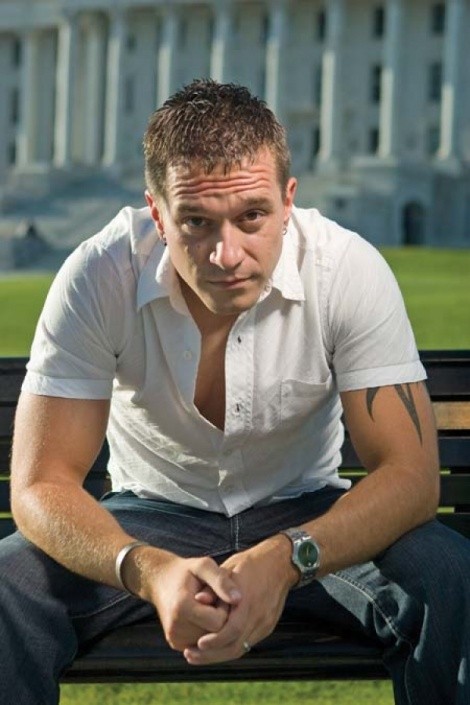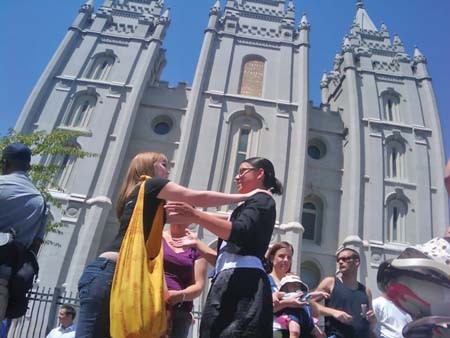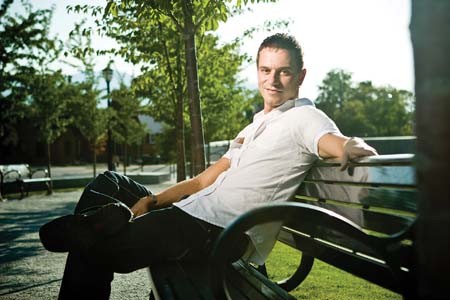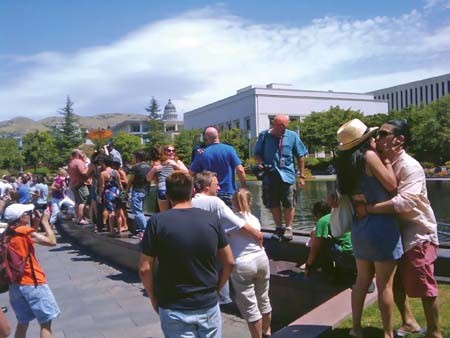
“The state didn’t show up—but everyone else did,” says Whipple.
The “state” in question is California, and Whipple, a Utahn, had planned to have his wedding there because his future spouse was a man. Until the passage of California’s Proposition 8 in November 2008, gay marriage had been legal in the Golden State. The Church of Jesus Christ of Latter-day Saints provided significant backing to help pass the measure, and this hit Whipple especially hard because he’d once been an active Mormon who served an LDS mission and attended Brigham Young University. When he came out as a gay man, however, the church turned him away.
“I was basically forced out of the church because of who I was,” Whipple says, “and then, years after that, here comes the church again trying to force their values down my throat. I felt like I had already fought that battle. I just wanted to tell them, ‘Quit chasing me down and get out of my life.’”
His old life chasing down his new life was what turned Whipple from someone who “was actively gay, but not an activist” into an accidental activist. Without forethought, his outrage became action, and he discovered it was much easier to let his voice be heard than he ever would have imagined.
The lesson in all of this? Don’t mess with the wedding plans of a gay man. 48 Hours
Whipple found out on the morning of Nov. 5, 2008, that Prop 8 had passed. Although he was initially despondent, Whipple became inspired by almost immediate protests at LDS temples in California. So, Whipple contacted the Salt Lake City Police Department, and after finding out how simply he could stage a rally and with no previous experience, he decided to organize one—a mere 48 hours later. Using primarily social media, text messages and e-mail blasts, he spread word of the protest. The gay community quickly seized upon the idea, followed by the local and national media and then the police department, who ordered a large security presence because of the expected crowd size.
Despite the advance buzz, Whipple still had no idea what to expect. “About 30 minutes before, when hardly anybody had showed up yet, I was saying to myself, ‘Oh my God, what did I start?’ I was thinking, ‘Am I going to hell for this?’”
Regardless of where Whipple ends up in the hereafter, 3,000 people showed up to his protest. It was an astounding number, given that the whole thing was thrown together by word of mouth in a couple of days by a virgin organizer. Protesters clogged downtown streets and essentially surrounded Temple Square, carrying signs and shouting slogans. Through it all, Whipple marveled that, “Even in red-as-hell Utah,” the crowd not only included the lesbian, gay, bisexual and transgender (LGBT) community, but also straight and even LDS supporters.
Ten Months Later
That rally, and the days surrounding it, marked a high-water mark for Utah’s gay community in terms of visibility and voice. The momentum spilled over into 2009 when, in February, state Sen. Chris Buttars, R-West Jordan, unwittingly rallied the LGBT community when his homophobic comments were captured by a documentary filmmaker. “[Gays are] probably the greatest threat to America goin’ down I know of,” he was heard saying on film, and, “They’re the meanest buggers I’ve ever seen.”
The community response culminated in a party called “Buttars-palooza,” where the hundreds who turned out showed, in a humorous way, the gay community and its allies would not be passive.
But as the year progressed, Whipple noticed fewer and fewer numbers attending events he organized. “People would say, ‘I already did it once. Why do I have to do it again tonight?’”
Without the street protests as a drawing card, it became difficult to turn the November momentum into any substantive legislative victories.
The most prominent push in the Legislature was the Common Ground Initiative, a package of bills focusing on equality in areas like employment and housing that was supported by Equality Utah. The group said the bills were prompted by a statement from the LDS Church after the November elections that said the church “does not object to rights for same-sex couples regarding hospitalization and medical care, fair housing and employment rights, so long as these do not infringe on the integrity of the traditional family or the constitutional right of churches.”
The statement by the LDS Church momentarily gave the gay community a glimmer of hope. But during the legislative session, the church—which refused requests for an interview for this
article—never specifically supported the Common Ground Initiative.
Without the church’s vocal support, the bills had no chance on Capitol
Hill.
Although none of those bills came close to passing, their mere introduction amounted to small victories because they actually received committee hearings. For political insiders and longtime activists, simply getting a hearing—even if one of them was with a Senate committee that included Buttars and other strongly conservative Republicans—was important. But for the casual observer, it could easily be seen as proof that change would never happen legislatively, and it could have sapped motivation to continue the fight.
It is not only frustrating on a state
level. On the national level, the election of President Barack Obama
and large Democratic majorities in both houses of Congress have failed
to repeal the “Don’t ask, don’t tell” policy in the military or the
Federal “Defense of Marriage Act” (DOMA), which states that marriage
can only be between a man and woman. Progress is being made, but it is
slow, with the biggest step being a mid-August statement from Obama
that he does not support DOMA.
The energy generated by the
November 2008 Proposition 8 rallies continued to wane—and it did not
help that Mike Thompson, executive director of Equality Utah, pulled up
stakes and moved to San Francisco in summer 2009. The group is
currently in the process of finding a new leader. Then, in July, a 3rd
District Court ruling refused to honor the parenting rights Gina
Edvalson had tried to create through a contract with her former lesbian
partner.
That same week, two gay men, Derek Jones (a City Weekly sales
rep) and his boyfriend Matt Aune were detained and removed from the LDS
Church-owned Main Street Plaza after, the men said, one kissed the
other on the cheek. The LDS Church argued the men were doing more than
innocently kissing, and their arrests had nothing to do with their
sexuality. The two men were cited for trespassing, although charges
were later dropped.
Just like in November, a protest was
planned, and once again it was organized quickly by alerting people
electronically. Instead of a march, this time a kiss-in was to be held
on the public right-of-way next to the LDS Temple Plaza. It seemed like
the perfect moment for the LGBT movement to regain some momentum, since
the same organization that strongly advocated for Prop. 8 in California
was now detaining gay men in Salt Lake City.
Except that the end result was about 100 people showed up.
Maybe
it was inevitable. It’s hard to expect people to maintain a
revolutionary fervor 365 days a year when they have jobs and families.
Maybe it’s simply that things have moved from the protest stage to the
more nittygritty stage requiring lower-profile activities like holding
town-hall discussions about workplace discrimination or volunteering to
work on city council races. Maybe it’s because expectations have risen
so dramatically over the past few years that the gay-rights fight is no
longer about defense but is now focused on gaining rights. Maybe the
conversation about LGBT issues has evolved to the point where
fever-pitch emotions are no longer needed. Maybe there’s a sense of
inevitability about the way things will end up in the long run.

“It was at 9 a.m. on a Sunday,” Whipple says. “Mormons will get up that early, but the homos are lazy.”
Some 10 months after the heady days of November, the question arises: Where does Utah’s LGBT community stand as a result of what happened, and where is it headed?
From Defense to Offense
Will
Carlson recalls that when he first began working for Equality Utah in
2006, he found he was spending all of his time trying to defeat bills
targeting the LGBT population. The game has changed, and not even four
years later, Carlson can say, “Now we’re talking about basic
protections every human is entitled to.”
“There’s a big
difference between now and five years ago,” notes Valarie Larabee,
executive director of the Utah Pride Center. “The level of awareness
and competency on LGBT issues has risen dramatically. The conversation
has become much more sophisticated.”
Whipple sums up the
situation by noting that during the last legislative session, “Nothing
passed, but nothing was brought against us, either.”
It should
also be noted that, from a national perspective, Salt Lake City’s gay
community is seen as a surprisingly forceful presence even while, as
Larabee says, “sitting in the shadows of the world headquarters of the
Mormon Church.” In a July 13, 2009, article for the liberal Nation magazine,
New York University professor Lisa Duggan, who describes herself as “a
leftist and a New York City dyke,” wrote about her visit to Salt Lake
City. She said she was “repeatedly blown away by the progressive
politics and outright queerness of the capital city.” She was so
impressed, she suggested doing “something truly weird and definitely
queer: Look to Utah for inspiration.”

That said, this is still Utah, whose conservative Republicans helped pass a constitutional ban on gay marriage. While every state in the union differs in its LGBT laws, court cases and issues, conservative strongholds like Utah face different challenges than more liberal enclaves. Thus, it’s difficult to forge a national consensus or movement, and groups in individual states are left to do what they can with what they have.
“I was hoping for more like an NAACP or an alliance of churches fighting together in a unified way,” Whipple says of the way the movement has developed. “Instead, we’ve just got a bunch of local grass-roots activists. It’s just something different. The problem is, the states are so divided and so unique. Everyone’s still trying to fight for something different.”
And in Utah, that fight will not be about gay marriage any time soon.
Jobs Before Matrimony
“Amendment 3 is a super-DOMA, so gay marriage is not a possibility. It would be fruitless. It’s not part of the agenda.”
The previous quote comes not from a gay-marriage opponent but, rather, Brandie Balken, interim-executive director of Equality Utah. Considering what happened in the 2009 legislative session, it makes political sense for the organization to take that position. One of the primary oppositions legislators had to the Common Ground bills was that, to conservatives, they represented a slippery slope to gay marriage. For 2010, Equality Utah wants to see the Common Ground bills advance in the Legislature with the focus on issues that are less polarizing than gay marriage.
“Marriage is a red herring,” Carlson says. “Polls show there are two areas of the Common Ground Initiative that an overwhelming majority of Utahns support: fair work and health care. Utahns in general are behind us on those issues. Now we just need to get the elected officials up to speed with their constituents.”
Rep. Christine Johnson, D-Salt Lake, one of three openly gay members of the Legislature, will be pursuing legislation in the 2010 session similar to bills she has run in the past two sessions to end anti-gay workplace and housing discrimination. “Those who live in a very conservative district have a right, and a duty, to represent their constituency,” she says. But even in some traditionally conservative districts, “while people are not supportive of marriage equality, they also really believe people shouldn’t be fired because of sexual orientation.”
The difficulty for her conservative colleagues is not supporting basic human rights, it’s the fear that small steps will lead to big leaps. Rep. Greg Hughes, R-Draper, leader of the Legislature’s Conservative Caucus, agrees that a majority of his constituents think gays and lesbians should have the same fair-housing protections as everyone else, and says, “I have no desire to withhold housing rights” or other civil rights from the LGBT population. dditionally, in his property management business, he regularly rents to LGBT tenants.
However, that doesn’t mean he’s going to vote for a bill extending housing rights.
“If
it were a bill that I knew could be contained to that one issue, that
would be OK,” he says. “But I’m afraid it might bleed over into other
areas, and those questions haven’t been answered to my satisfaction.”
From Zero to Hope
While
listening to House Speaker David Clark, R-Santa Clara, discuss the
chances of any Common Ground bills passing, it’s hard to see much
change in the near future, but also hard to see the status quo
maintained for long.
“We have the same people with the same
personalities,” he says of the session that will begin in January. He
predicts the session will focus on budget shortfalls, and as far as
LGBT issues go, “I’m not expecting a different outcome. I would be
surprised if things were any different. I think the die is cast—at
least for this session.”
While there is not much change in the overall population
of lawmakers, there are a couple of significant changes in the
Legislature and overall state leadership. The loss of former Gov. Jon
Huntsman Jr.—who came out mid-session in favor of civil unions and is
widely credited as the impetus behind the Common Ground bills getting
committee hearings in the House—is most strongly felt.
Morgan
Philpot, a former Utah House member who is now the vice-chair of the
Utah Republican Party, says Common Ground faces a tough road in the
next session, “especially because they’ve lost the greatest Republican
asset to that fight in Gov. Huntsman.” Replacing Huntsman is avowed
conservative Gov. Gary Herbert, who has spoken against gay marriage,
does not support legal protections for gay and lesbians, and, more
importantly, is run for reelection in 2010.
“I’m very doubtful he’s going to be jumping on the equality bandwagon,” Johnson says.
Also,
the Senate has lost Greg Bell, who will soon be confirmed as Herbert’s
lieutenant governor. As a senator, he opposed civil unions, but he
carried bills to allow domestic partnerships—and was considered the
most moderate Republican senator, even more so than some of the
Democrats. Bell’s replacement likely will be much more conservative.
Clark’s
emphasis on “this session” is important, however, because Clark seems
to recognize that 2010 will not mark the end of the debate.
“I
look backward at a lot of issues that stir up a lot of emotions and
there seems to be a process for this that takes four or five tries,” he
says. “It takes time and persistence.This may very well be the natural
process for this.”
Clark met with Equality Utah and Johnson
last session for what he says was “an amicable discussion,” in which he
felt Johnson “expressed genuine, heartfelt concern.” During that
meeting, Clark says, “I was noticing from a personal standpoint that
each generation has a different view of this, from my grandparents to
my parents to my generation to my kids. Each generation is more
responsive to what is happening at the time.”
If even the leader of one of the most conservative
legislative bodies in America has a hint about which way history is
headed, it’s hard not to see LGBT civil rights, including gay marriage,
becoming a reality at some point down the road. After all, no less a
conservative than George Will has stated that gay marriage will be a
non-issue for the next generation, and has even suggested that the
Republican Party may have to address gay issues as early as
the 2012 elections. When the Iowa Supreme Court ruled in favor of gay
marriage in April, Iowa Senate Majority Leader Mike Gronstal decided
against trying to battle the decision after his daughter, Kate, told
him same-sex marriage opponents “had already lost” and her generation
didn’t care.
As
for how history might play out in Utah, Johnson notes, “We have a very
mature Legislature. A lot of the legislators are the age of Chris
Buttars or older.”
But
even when the Buttars generation retires, Philpot says the Utah
population will still have many voters ready to elect representatives
who are opposed to gay marriage because, “This is an issue of religious
belief. There will be opposition here in Utah. You have a religious
belief that is a determining factor in the decision-making process.”
Which means that, as with many other political issues, Utah may end up
going one way while the rest of the country goes another.
“Do
I think there will be gay marriage in the future?” Philpot asks. “From
a state perspective—no, I do not. Do I think it will be the same case
nationally? No, I do not. Gay marriage may become a non-issue for much
of the rest of the nation, but the rest of the nation isn’t quite like
the West, and the rest of the West isn’t quite like Utah.”

“This is not inevitable like the setting sun,” Carlson warns. “It’s going to happen only as long as people are working on it. It’s still the case that today’s the day.”
Hughes,
who, as a younger conservative, will likely still be involved in
shaping the discussion in years to come, says, “There is still a debate
yet to be had.” He also points out, “You have to pay attention” to the
fact that California voted down gay marriage, since “no one is going to
say California is a red state.”
“Keep Being Out There” History
may end up showing the summer of 2009 was a period when Utah’s LGBT
community and its allies were taking a relatively quiet break between
the upheavals of November 2008 and whatever events may lie ahead.
“Summer’s
here. Pride’s over. It’s hot out. The Legislature’s not in session,”
Whipple half-jokes when listing reasons for why things seem laid-back
right now.
Johnson agrees and says the current stage is more
of a respite than a falter. “My feeling is this is sort of the calm
before and after the storm,” Johnson says. “It’s just that period of
time when there’s a lull.”
However one wants to label the
current period of time, it also seems to be the case that, 10 months
after Prop 8 passage, the “time and persistence” Clark speaks of will
be required.
“My perception of how we’re going to do this is
to just keep being out there,” Whipple says, “so it won’t seem like a
big deal anymore, and the more people are going to get used to us.”
More Good Reads
Activists rally to support gay couple
Discrimination against blondes
Writer pretends to be gay at seminar
Online resources that cover the gay community: